|
|
|
Sort Order |
|
|
|
Items / Page
|
|
|
|
|
|
|
| Srl | Item |
| 1 |
ID:
167106


|
|
|
|
|
| Summary/Abstract |
Although the collective memory of war is frequently invoked in post-war societies, who chooses to invoke it and to what effect has been less studied relative to other aspects of such societies. In this article we employ a case study of Sierra Leone to address this deficit in the post-conflict scholarship by illustrating how the collective memory of that country’s civil war is appropriated by diverse actors in the post-war society. Drawing from field interviews, we present evidence showing how, and why, several societal groups constituted as distinct post-war identities such as victims-rights groups, former defenders of the state, or perpetrators of the violence during the Sierra Leone civil war articulate dissatisfactions with their livelihoods and the reactions of state officials to their demands. The article explains why, and how, successive governments have selectively suppressed the discontent of some groups over livelihood insecurities that are construed as threats to public order while ignoring violent protests from other groups over similar issues, in spite of a 1965 public order act restricting protests. Thus, the article argues that state officials in Sierra Leone have not demonstrated superior commitment to peacebuilding than societal groups that make demands on the state.
|
|
|
|
|
|
|
|
|
|
|
|
|
|
|
|
| 2 |
ID:
167099
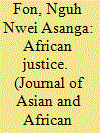

|
|
|
|
|
| Summary/Abstract |
In 2017, the African Union adopted a non-binding resolution calling for a collective withdrawal of its members from the International Criminal Court (ICC). An exodus from the ICC poses the question of what happens next in the African judicial landscape. This paper probes into efforts to erect an African judicial infrastructure. It is a non-experimental case study that employs the characteristics of international law to examine various attempts towards forging an African judicial system. A critical examination of existing African judicial institutions against certain benchmarks of international law reveals that alternative structures and mechanisms of international justice exist in Africa.
|
|
|
|
|
|
|
|
|
|
|
|
|
|
|
|
| 3 |
ID:
167104


|
|
|
|
|
| Summary/Abstract |
In Africa, rural communities thrive on social capital and tend to have a number of commonalities that force them to share natural, physical and social resources. It has been a trend in sub-Saharan Africa to have either formal or informal collaborative management agreements to manage common pool resources (CPRs) to accommodate different actors and interests. This paper draws lessons from past and contemporary collaborative schemes in Cameroon and South Africa to enhance the practice and governance processes of natural resources in sub-Saharan Africa in order to promote sustainable development. Using research methods inspired by the tradition of participatory research to collect field-based data and complemented by reflections on previous and existing studies, the paper highlights the importance and benefits of participatory democracy as opposed to representational democracy in co-management of natural resources in rural spaces. It further discusses the need to redefine the roles of national and local governments, the youths and women in ensuring effective participation and the essence of unifying the judicial and culture. To guarantee sustainability of collaborative community-based natural resources, the paper emphasises the role and importance of youth and women empowerment. These issues have been discussed within the broader sustainability discourse.
|
|
|
|
|
|
|
|
|
|
|
|
|
|
|
|
| 4 |
ID:
167100
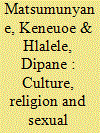

|
|
|
|
|
| Summary/Abstract |
This paper explores community dialogues as social interaction in search for sexual diversity in Lesotho, in an effort to influence positive and more directional thinking towards sexuality and sexual behaviour. Guided by queer theory, we firstly explore cultural and religious dimensions defining acceptable and unacceptable sexual behaviour; their influence on attitudes towards the lesbian, gay, bisexual, transgender, questioning (or queer) and intersex (LGBTQI) community, leading to their daily negative encounters; and, lastly, we suggest community dialogues as a mediator that influences more positive attitudes and guides acceptability towards this vulnerable population. Three main themes emerged after the adoption of a thematic analysis: there is denial of the LGBTQI existence; stigma and discrimination towards this minority population also prevail; and the LGBTQI population in Lesotho experience emotional and physical attacks.
|
|
|
|
|
|
|
|
|
|
|
|
|
|
|
|
| 5 |
ID:
167118
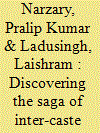

|
|
|
|
|
| Summary/Abstract |
In India marrying across the caste kindles strong community resentment, leading to the extent of honor killing, yet few couples dare to defy this stringent social norm. Analysis of large-scale survey (India Human Development Survey 2011–12) data exhibits an inconsequential rise in this social incongruity since 1951 to attain 4.5% in 2012. It is most prevalent in the northeastern region (11.6%), but least prevalent in caste-ridden central India (1.8%). Multi-variate statistics exhibit that if women are allowed to choose their life-partner, caste takes a rear-seat in marriage contemplation. It is quite prominent among the women who selected the husband by themselves and knew the husband at least one year before the marriage. Contrary to general notion, education is not able to promote inter-caste marriage. Odds of inter-caste marriage taking place in Dalit (lowest social standing) households is much lesser than the higher caste. Resilient targeted efforts are necessary to promote inter-caste marriage, which may loosen the noose of the caste system in India.
|
|
|
|
|
|
|
|
|
|
|
|
|
|
|
|
| 6 |
ID:
167120
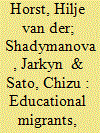

|
|
|
|
|
| Summary/Abstract |
Previous research on transnational migration and information and communication technologies (ICTs) demonstrated how ICTs shape transnational social relationships. What remains less explored is how ICTs shape spatial dimensions of such relationships. Also, international educational migrants constitute a substantial part of transnational migration flow, yet their everyday lives are not well studied. Building upon material semiotic scholarship, we examine how ICTs shape socio-spatial dimensions of transnational relationships in the lives of educational migrants, and the impacts that such relationships have on their everyday lives. This research is based on the empirical exploration of 21 in-depth interviews with educational migrants who came from Central Asian and African countries to the Netherlands. We show that spatial relationships, such as co-presence and distance, are not naturally ‘given’ but are instead enacted in heterogeneous communication practices of educational migrants, and these relationships produce both enabling and constraining effects on their everyday lives.
|
|
|
|
|
|
|
|
|
|
|
|
|
|
|
|
| 7 |
ID:
167098
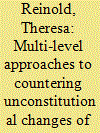

|
|
|
|
|
| Summary/Abstract |
This article assesses the impact of multi-level approaches to the problem of unconstitutional changes of government (UCGs) on the rule of law at the national and global level. Based on a single-case study of the 2016 Gambian UCG, this article concludes that multi-level governance tends to strengthen the rule of law at the national level, but only if certain conditions are met. These include an agreement about the rules of the road regulating how the different layers of governance interact – subsidiarity v. precedence for organizations from higher levels of governance – and the definition of a common purpose. Such unity of purpose is easier to attain if the (geo)political stakes of a crisis are relatively low, the prospects of success of a military intervention high, and if the perpetrators of the UCG have forfeited their legitimacy both locally and globally. This prevents them from exploiting institutional rivalries and shrinks their space for diplomatic manoeuvre and thus their ability to use forum shopping for their benefit. If these conditions are met, then multi-level responses to UCG will strengthen the rule of law at the domestic level, while at the same time potentially undermining the rule of law at the global level.
|
|
|
|
|
|
|
|
|
|
|
|
|
|
|
|
| 8 |
ID:
167110
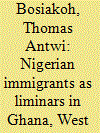

|
|
|
|
|
| Summary/Abstract |
The mobility/immobility research frontier in migration scholarship has gained ascendancy since the beginning of this century with some studies highlighting the need for broader global trends in cross-border mobility/immobility research. This article on Nigerian immigrants as ‘liminars’in Ghana, West Africa, is an attempt to join the global cross-border mobility/immobility discourse on mobile people. It is anchored in the qualitative research tradition with the empirical data generated through in-depth interviews, observations and market conversations with 41 Nigerian immigrant entrepreneurs in Accra (the capital of Ghana), Kumasi (the second largest city after Accra) and Ashaiman (a sprawling sub-urban settlement). In a three-theme analysis approach, the paper shows three intersections in mobilities, immobilities and borderland accounts, namely mobility/borderland, trapped/living in a borderland space, and immobility in temporal-spatial borderland, and places the immigrants into a liminar category. This article is a contribution to understanding the mobility/immobility research frontier from the perspective of the global south and its impact on global southern ‘citizens’.
|
|
|
|
|
|
|
|
|
|
|
|
|
|
|
|
| 9 |
ID:
167113


|
|
|
|
|
| Summary/Abstract |
Ghana implemented the National Health Insurance Scheme (NHIS) in 2005 with the intention of providing residents with quality affordable healthcare. Over the past few years, concerns have been raised about the quality of healthcare clients receive. This study assesses the experiences of NHIS subscribers with the quality of care they receive under the scheme by both private and public hospitals. The results from the 56 interviews show that the majority of the subscribers were dissatisfied with the overall quality of healthcare they received in both private and public hospital because of the long waiting hours, the poor attitude of nurses and the demand for payment of additional money. Even though clients who visited the private hospital paid for all services, excluding consultation, their level of satisfaction with the quality of healthcare was relatively higher than those who visited the public hospital. The paper concludes that NHIS clients do not receive the quality of healthcare the scheme promised, and this has implications for premium renewals and health-seeking behaviour.
|
|
|
|
|
|
|
|
|
|
|
|
|
|
|
|
|
|
|
|
|